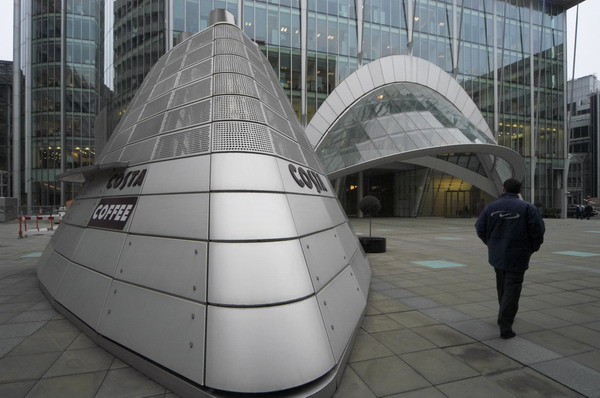On the 21 June, as a part of the 2011 London Street Photography Festival, six photographers, each accompanied by a videographer was sent to film in different areas of the City of London.
As it says on YouTube:
Some used tripods, some went hand held, one set up a 5 x 4.
All were instructed to keep to public land and photograph the area as they would on a normal day. The event aimed to test the policing of public and private space by private security firms and their reaction to photographers.
All six photographers were stopped on at least one occasion. Three encounters led to police action.
You can see what happened in some detail in the film ‘Stand Your Ground‘.

I had no problems taking pictures like this in 1992
It had a particular interest to me for several reasons, not least because I know the photographers concerned and the places they were photographing in. They were all places where I’ve photographed over the years, mainly without problems, though I’ve come up against some of the same attitudes that these six people met. Mainly I’ve had problems when I’ve been in places we might think were public – walkways and estates that are open to the public but are actually privately owned. Years ago, so long as you didn’t hang around too long, you were unlikely to be noticed taking a few pictures, but now our every move is covered by surveillance cameras. There is a certain irony in the fact that because we are continually being pictured we can no longer take pictures.

But a security guy is just walking away after telling me I can’t take pictures here in 2004.
I’d stood my ground an told him to go and check the law with his manager, and surprisingly he walked away to do so – I think he was new at the job!
What is positive about the film is the behaviour of the City of London police when called out by the security guards when the photographers refused to stop taking pictures. There is perhaps just a little unnecessary questioning of the photographers but generally the policemen in the film are quite clear on the law and on the right of the public to take photographs in public places, and make the position clear to security.
I have a feeling that there are still many police forces around the country where there would be a different response, so the City force deserve some credit. But clearly photographers apparently still need to make an effort to educate the security firms and their employees at all levels.
A couple of years ago I suggested that we – perhaps through the ‘Photographer Not A Terrorist‘ organisation which has organised previous flashmobs – should organise a mass photoshoot in the city. I wasn’t thinking of half a dozen photographers, but perhaps hundreds (or even thousands) all coming into the city at the same time on the same day and making the point that we have a right to photograph in public places.
Personally I’d like to go further and try to establish a right to photograph in all places freely open to the public at those times when the public are allowed to access them freely, which would return our right to take pictures in the estates like Broadgate and places like Trafalgar Square. With increasing areas of public space no longer being truly public we need to fight to retain our rights. But perhaps we should go one step at a time and start by asserting those rights we already have by law but which others try to deny in practice.